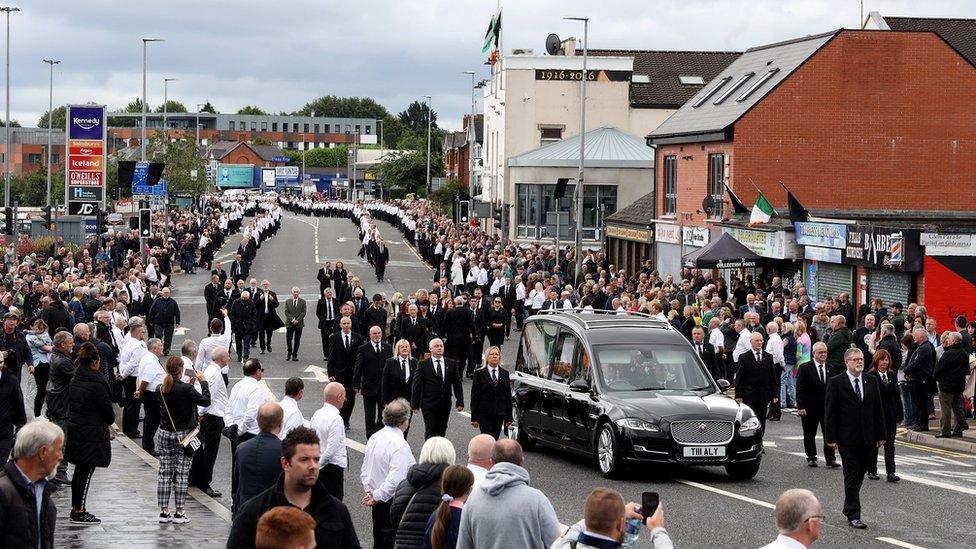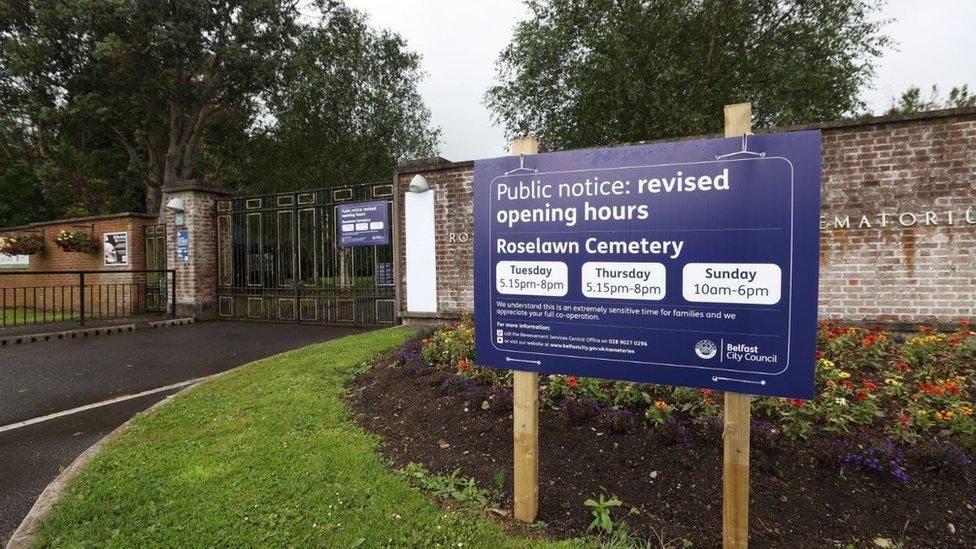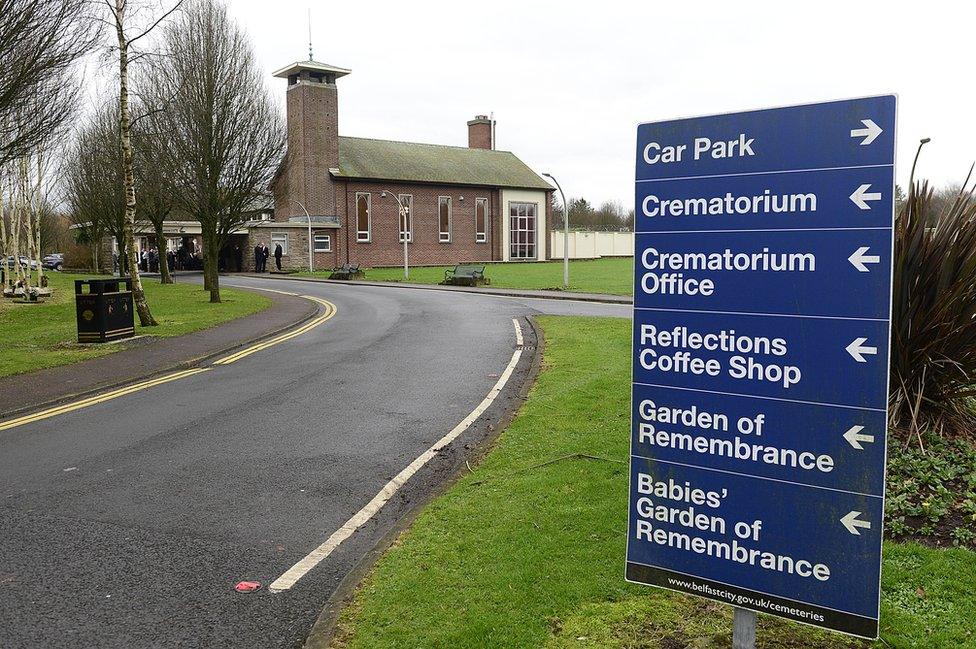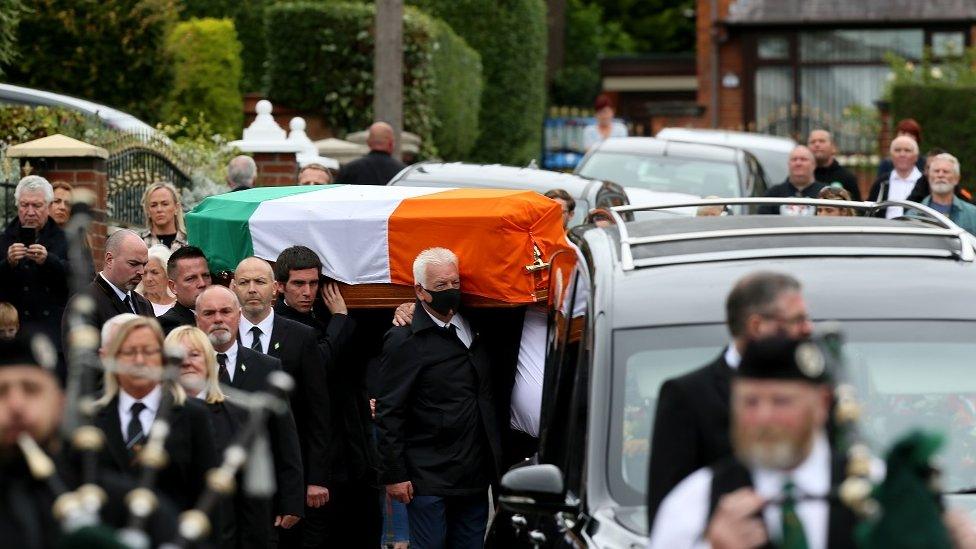Bobby Storey: No republican takeover for cremation, says report
- Published

Bobby Storey (left) was a close friend of former Sinn Féin leader Gerry Adams
An independent report into how Belfast City Council organised the cremation of republican Bobby Storey has found Sinn Féin did not pressurise the council to give his family special treatment.
It also rejected suggestions there had been a "takeover" of Roselawn cemetery.
There were claims that republicans had controlled what happened at the site and that council staff were sidelined.
The investigation looked into why Mr Storey's relatives were treated differently to eight other families.
Those families were not allowed to stand outside the crematorium at the cemetery, unlike the Storey family.
The report into the events in June 2020 was published on Thursday by barrister Peter Coll QC.

A large number of mourners turned out for Bobby Storey's funeral in west Belfast
"There is certainly no evidence of what could come close to being described as a 'takeover' of Roselawn by those acting on behalf of the family," he concluded.
"At all times Belfast City Council staff were at the gate."
Mr Coll also rejected the allegation that pressure was put on council officials in the run-up to the cremation.
'Different treatment simply wrong'
"It appears to me that the evidence does not establish that the determining factor for the difference in treatment was Mr Storey's status as a former senior member of Sinn Féin per se, nor that in some way Sinn Féin had applied pressure to have the change regarding committal services brought about."
However, in the 116-page report, which had been due to be published in October last year, he said the council made mistakes.
He writes: "The differential in treatment should have been realised by all those involved on an organisational level.
"The differential in arrangements for the cremations that day was avoidable, unnecessary and simply wrong and steps should have been taken to prevent the differential from arising in practice."
'Rules are there for everyone'
Speaking at Thursday's NI Executive press conference, First Minister Arlene Foster said she has not yet read the report, but that her thoughts are with the families involved.
"There were eight families who were not afforded, at that particular point in time, the same treatment as the Storey family by Belfast City Council and at Roselawn," said the DUP leader.
"No report of any nature is going to take away the hurt and the pain that those families felt when they found out that they had been treated differently.
"The rules are there for everyone."
Finance Minister Conor Murphy welcomed that the report recognised that there was "no political interference nor pressure put on staff in relation to the handlings of these funerals".
"There were other families that used that service and centre that day and they have had trauma added to their pain, including the Storey family themselves," added the Sinn Féin MLA.

Roselawn Cemetery and Crematorium is run by Belfast City Council
The report had been shared with the families affected before it was made public.
In July, the council apologised to the families who were not allowed into the cemetery while up to 30 friends and relatives of Mr Storey were allowed to do so.
On Thursday the party group leaders on the council repeated the apology and described the differential treatment as "unacceptable".
"We will act swiftly to ensure that a repeat of such a situation occurring is avoided and that no other family would experience the hurt and pain of the families affected," they said.
They added that the report had taken longer to complete than had been expected.
"However, it has been a complex and detailed investigation, made all the more challenging by the ongoing pandemic, and it was essential that the investigation was robust and thorough."

Analysis: Can the council be excused?
In a divided city like Belfast, the arrangements for the cremation of a senior IRA figure need to be handled carefully.
Nobody disputes that mistakes were made by Belfast City Council - the question is whether the errors were, in any way, excusable.
It all happened in the middle of a pandemic.
Council officials were working long hours, often remotely, to try to keep the city compliant with fast-changing Covid-19 regulations.
Decision-making around the cremation appears to have been rushed.
For the families who lost out and were not given the chance to accompany their loved-ones on a final journey, nothing can right the wrong.
What they do have now, however, is an explanation.

Mr Storey died on 21 June last year.
There has been long-running controversy about the events on the day of his funeral.
Thousands of people gathered in west Belfast to line the route from his home to the service at St Agnes' Church on Andersonstown Road.

Eight families were denied access to Roselawn for the cremation of their loved ones on the day of Bobby Storey's funeral
Deputy First Minister Michelle O'Neill and other senior Sinn Féin figures were widely criticised for attending the funeral, with claims they broke coronavirus guidelines.
In December, the Police Service of Northern Ireland said an investigation into potential breaches of the rules has been completed and a file has been submitted to the Public Prosecution Service.
Who was Bobby Storey?
The west Belfast man was considered the head of intelligence of the IRA for a period from the mid-1990s and was named as such under parliamentary privilege.
Security sources linked him to several major incidents, including the £26m Northern Bank robbery in 2004, external.
More recently he was northern chairman of Sinn Féin.
He spent more than 20 years in jail, beginning with internment without trial when he was 17, a year after he joined the IRA in 1972.
In 1981, he was sentenced to 18 years in prison for possession of a rifle after an attack on the Army.
He was a close friend and lifelong ally of former Sinn Féin president Gerry Adams.
When he was released from jail in 1994, Mr Storey was seen as a key individual in selling the peace process to republican hardliners.
Related topics
- Published6 July 2020

- Published14 May 2024
